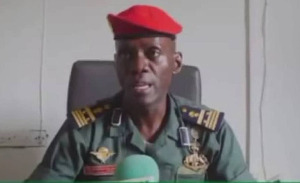If numerous accounts and pictures shared on the social media are anything to go by, the troops from Chad who retook Gambouru from Boko Haram have hoisted the Chadian flag in the town. The Chadian troops had been dispatched to Northeast Nigeria to help the Nigerian military authorities intensify the campaign against the Islamist group.
In an arrangement backed by the United Nations, African Union and Economic Community of West African States, the countries of Benin, Cameroon, Chad, Niger and Nigeria would be joining forces to combat the terrorist group, whose activities have since become trans-border, with Cameroon being the worst hit.
Boko Haram has been on a clueless campaign of terror, causing maximum damage to life and property in their places of operation. The group’s modes of operation have included suicide bombing, planting of IEDs at schools and market or public transport stations, arson, abduction, ambush on military detachments, raid on military barracks and police stations, scorched earth, direct battles with soldiers and civilian collaborators, and lately, seizure of territories.
In the course of their campaign, Boko Haram commanders have declared a stretch of territory the size of Belgium in Northern Nigeria as an independent Islamic Caliphate.
The reign of terror has left more than 15, 000 people killed and over 1.5 million persons displaced within and outside Nigeria. The recipient countries of these Nigerian refugees have been Niger, Cameroon and Chad, with the last two countries making it mandatory for their Nigerian guests to learn the national anthems of their hosts.
The expanding terror operations and incursions into neighbouring soils of the Boko Haram group startled Nigeria’s Francophone neighbours and the direct threat two months by “one of the Shekaus” to unleash attacks on “lowly” Cameroon jolted Paul Biya, who promptly cried out for help from foreign (European) allies and Chad.
The French and Chadian governments quickly resolved to meet their Nigerian counterparts to strike a deal that would present the most effective counterforce ever to Boko Haram. The French government, for obvious reasons of mistrust between both countries and age-long cold war and suspicion over regional hegemony, had to reassure Nigeria that it would not operate directly on the latter’s territory in order not to compromise Nigeria’s sovereignty.
The African countries were however allowed to operate directly from within Nigeria, with Chad leading the pack and settling to work immediately. In a space of 24 hours, the Chadian forces had routed Boko Haram cells in Gambouru and liberated the town, making it the first time since independence that Nigeria would be having foreign troops on its sovereign soil.
And immediately too, they had allegedly hoisted their flag. While hoisting it in their base might be a general practice of nationals in war time to remind them of and indicate their presence in a particular war zone, it may not be the same inside a sovereign territory of a country that is being helped. At worst, the Nigerian flag should be side by side with the Chadian flag.
The African Union had approved a 7, 500 troops to add up to what is currently on ground, which implies that more foreign soldiers will be coming soon to help in the war against Boko Haram. It is understandable that the terror activities and ominous spread of its operations might consume not only Northern Nigeria but the rest of the Sahel area, particularly Cameroon, Niger, and Chad. The rate at which the terrorist group was operating: abducting school children, raiding villages and towns and engaging in large scale killing and destruction along the borders, was alarming enough to warrant a multinational approach to resolving the international problem.
The January 2015 attack on Baga, with satellite images showing massive arson and slaughter of unprecedented proportions attracted international concerns and adding up to pent-up anger following the abduction of and still missing 219 Chibok girls since April 2014, there arose a global outrage matched by strategic planning on how to decimate Boko Haram.
But the acceptance of Nigeria to have its smaller and less powerful neighbours, known for their own skirmishes and forceful taking of Nigerian villages in the past, was going to talking points and cause for concern. Chad had been helped in the 1980s by Nigeria to quell its internal strife as well as stabilize it after the war. Most of Chadian food supplies and exotics are imported from Nigeria.
Chad also makes a huge percentage of its revenue from selling livestock to its Anglophone neighbour. The protracted Boko Haram war had impaired free flow of goods and services, which had hampered economic growth for Chad. The other alternative that Chad had, Cameroon, was also gradually coming under the Boko Haram siege and sooner than later, the trade and commercial routes too would be blocked. The Chadian state thus had no choice than to help fight Boko Haram. It is for national survival, a ‘raison d’être’, very much in alignment with Morgenthau’s position about the very essence of the international politics of states.
But we cannot also forget so soon, how Chad had been indicted in the Boko Haram menace in Northeast Nigeria, particularly in the wake of the phantom ceasefire talks and agreement. It all looked like a Chadian conspiracy with Boko Haram to buy time and recoup for a more organized onslaught, which eventually happened.
Before his decampment to the ruling party, the alleged founder of Boko Haram was a permanent guest of the Chadian President, Idris Debbie, with whom he handled the ceasefire hoax. Debbie was also a product of the rebel group that invaded old Borno in the1980s after the Chadian war, to seize lands and displace Nigerians in cities and villages.
It is therefore pertinent to note that the forces of liberation might end up to forces of occupation. The history of Nigeria-Chad relations is not a particularly pleasant one. This is why Chad cannot be trusted; just as France, their benefactor, also cannot be trusted.
It is humiliating enough to have foreign troops on the soil of “almighty” Nigeria. Never before had the country been a global, continental or regional ’security charity’ case or needed external forces to tackle its internal security problem. The coming of the foreign troops depicts a sorry case and a country that cannot help itself. It shows, and awfully so, the deteriorated state of our security architecture. It can be more humiliating to watch the foreign soldiers conducting themselves in a manner that portrays ridicule or slight, to underscore the demystification of the Nigerian military power, honour and pride.
Let us not however be deceived that France or the African neighbours have come to help us. They have come to help themselves. First, they can see the end of a threat from their biggest and stronger neighbour. Second, they can potentially dead whale washed ashore from which they take deep cuts. Third, they need to secure their neighbours to avert a Boko Haram doom on them too.
Fourth, Nigeria is their major source of economic stability and the protracted terrorist crisis was spoiling trade and commerce for them. Fifth, they have to use their military presence in Nigeria to showcase their own military strength and leverage on it to shine and move up the ladder of strong armies on the continent, the same way smaller countries have climbed on the back of Nigeria’s Super Eagles to move up the ladder of football ranking.
Opinions of Sunday, 15 February 2015
Auteur: nationalmirroronline.net













